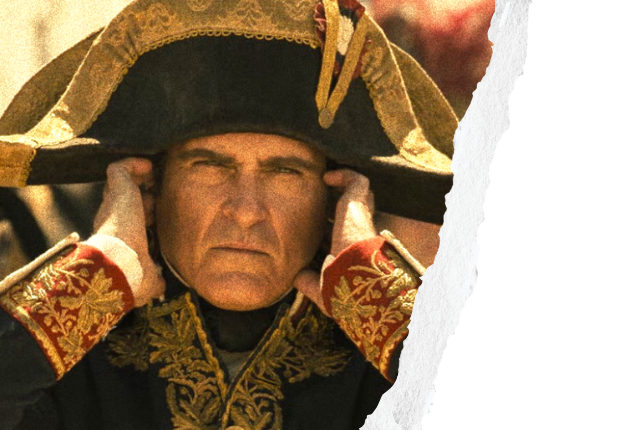Movie Review: Napoleon
From the preview that came out a few months ago, the online right produced three main pre-criticisms of Ridley Scott’s Napoleon. The first, and most common, was that the lighting diminished the aesthetic quality of the film, and made the historical period – which was in truth resplendent with bold color – look dull and drab. The second was that Scott’s choice for Napoleon, Joaquin Phoenix, was too old. Napoleon’s military career, usually considered to have spanned the period from 1793 to 1815, from his 24th to 46th year. Phoenix is 49. The third was the expectation that the film would twist the facts of Napoleon’s life to suit modern predilections. Specifically, that meant portraying his relationship with his oft-unfaithful wife as the prime motivator of his unquenchable thirst for, ahem, imperial expansion.
As preemptive criticisms, all three were correct, if not entirely. The lighting isn’t that bad, and the costumes are quite interesting. The preview focused on the film’s depiction of the battle of Austerlitz, which took place in December. Much of the rest of the film is shot in rather magnificent light; if anything at times it appears to be too washed out. Phoenix is certainly too old for the role, but the real problem here is not so much his age as his utterly uncompelling portrayal. He seems to have interpreted Napoleon as a kind of archetypal Fool: bumbling and stuttering, the line between drama and comedy being blurred more than once, but never, seemingly, with deliberate intent.
Indeed, the moments that are intended to be the most serious come across as the most laughable. And when comedy was intentional, it was unfunny, such as the several moments when the script randomly dips into modern zilliennial parlance. Of the English, our Napoleon exclaims: “You think you’re so great just because you have boats!”
The cuckolding aspect, while relevant, is not as central as we might have suspected. Certainly, the relationship to Josephine is the main focus of the film, but she is depicted as being able to longhouse Napoleon without needing to hold the threat of cuckolding over his head. REN’s predicted open cucking scene atop the Great Pyramid, with Josephine cavorting with Matt from Tinder while Napoleon and the Army of Egypt observe from a distance, sadly never happens. Josephine exerts power over her husband as if by magic — magic that flows, as an early scene reveals, straight from the negative space between her legs.
The general absurdity of the film is encapsulated in one particular scene. Napoleon has returned from his exile on Elba, and is marching towards Paris. In real life, when Napoleon encountered the first regiment of his former soldiers sent by the re-installed monarch, Louis XVIII, he famous walked up to their line and shouted, “Kill your Emperor, if you wish!” His soldiers were immediately converted by his aplomb and panache, and their commanding officer, Marshal Ney — who had promised to return Napoleon to the king “in an iron cage” — embraced Napoleon and co-led the growing army with him as it marched on Paris. What we get in the movie is nothing anywhere near as interesting or inspiring. Phoenix’s Napoleon, his nasally voice cracking seemingly with every pause, makes an emotional appeal to his former soldiers that amounts to, “I have missed you, please take me back.”
This, and the many scenes that focus on the relationship between Napoleon and Josephine (as our friends at Conundrum Cluster have pointed out, it seems as those this film may have originally been intended as a low-budget project that would focus exclusively on the relationship between the emperor and erstwhile empress) serve to illustrate what seems to be Scott’s ultimate objective: to present Napoleon as a petulant manchild. But there are at least two insurmountable problems with that aim: 1) Phoenix’s age, against which apparently no effort was made by the make-up team, and 2) the inability of the audience to suspend disbelief in the face of the utterly contradictory claims the film makes about the man. This is why I highlight the scene that depicts the return from Elba. It’s obvious to any reasonable person that only a man of epochal charisma would be capable of turning such a situation to his favour. But Scott wants us to believe that Napoleon, up to this point, has only been successful out of an irrepressible drive to please his insatiable wife. The notion that a man of power may be motivated simply by the innate desire to conquer and rule is not given a hearing at all, let alone a fair one. The prime mover must be a woman.
There is an alternative to Josephine for the role, and that is, of course, Napoleon’s mother. Josephine makes an early allusion to her, by which the audience is led to expect a significant Freudian dynamic at some point. But no such thing ever arrives, and the sole role of Napoleon’s mother is as his madam. She uses a minor Spanish noblewoman as a guinea pig to assure Napoleon’s sexual potency (a major plot point is his and Josephine’s inability to conceive). His mother, and the woman he impregnates via her experiment, not to mention the child, are swiftly forgotten. It’s clear that Scott wanted to add a Freudian subtext to the film, perhaps to bash the French yet further – he’s done nothing to disguise his glee at the ruckus the film has caused among French critics – and yet he doesn’t follow through. The unusual display of bonding between Napoleon and his mother acts as an apt metaphor for the botched nature of the film as a whole: Scott, the amnesiac boomer, forgets the thread and just carries on as if nothing has happened.
The biggest frustration lies, ultimately, with Scott’s choice of Phoenix, whose portrayal of Napoleon is bizarrely reminiscent of his lauded rendition of the Joker in 2019’s Joker, has clearly already achieved as an actor what Scott was looking for in his Napoleon. Only, he did it as Commodus in Gladiator in 2000. Of course, both men were 23 years younger when that film was released. But Commodus — memorably interpreted by Phoenix as vain, vindictive, resentful, sexually deviant, and motivated by perverted lust — had all the same qualities that Scott is hoping to convince the audience that Napoleon also had. The only difference is that Napoleon held the whole world in awe for the better part of two decades, while Commodus portrayed himself as akin to Hercules and was ultimately assassinated by drowning in a bathhouse.
But even if Phoenix had simply reprised his role of Commodus in his portrayal of Napoleon, it would still have strained credulity to breaking point and beyond, given what we know about Napoleon’s enormous successes. No effort is made to disguise or downplay Napoleon’s battlefield prowess: many of his famous victories are depicted. Disappointingly, though, for the military history buffs among us, these depictions are generally either inaccurate or too unclear for us to understand what is going on.
The genius of Napoleon’s tactics and leadership should have been given a fair explanation, but it’s as though these matters were simply unimportant to the director. Everything must be made to serve Josephine, even “the soul of the world,” as the philosopher Hegel dubbed Napoleon when he saw him ride by his window. Behind every great man, Scott would have us believe, there lies a greater woman. Revealing the true fatuousness of that idea, its complete incoherence, will be Napoleon’s greatest service to culture in 2023.

































